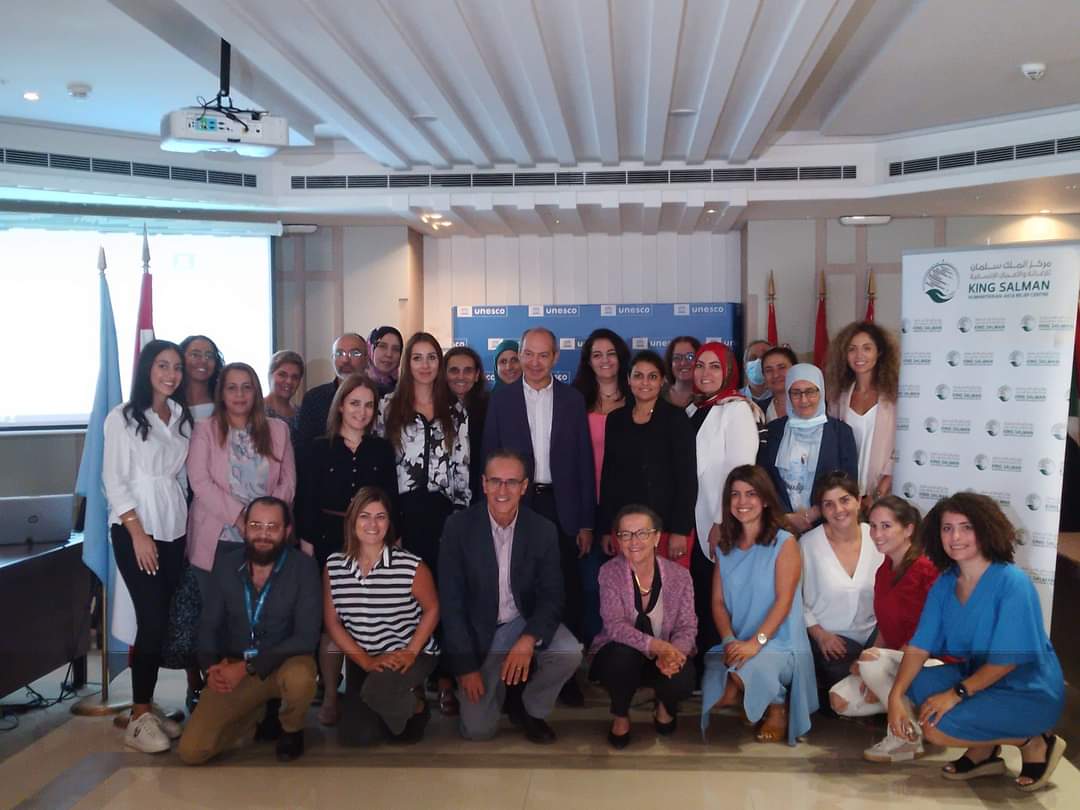العودة

Capacity Building Workshop to Support the Implementation of Inclusive and Comprehensive Education in Lebanon
التعليم للجميع
2022 - 10 - 10

The UNESCO Regional Bureau for Education in the Arab States (UNESCO Beirut) and the United Nations Economic and Social Commission for West Asia (ESCWA) organized a two-day national capacity-building workshop (6-7 October 2022). The training was focused on 14 modules jointly developed by the UNESCO Regional Bureau for Education in the Arab States and ESCWA with funding and support from the King Salman Humanitarian Aid and Relief Center (KSRelief) within the framework of their joint resource development project “Education is Peace”.
The workshop was held at the UNESCO Regional Bureau in Beirut and brought together 25 trainers, coaches, teachers, mentors, instructors in Lebanon or training program administrators specialized in teacher training.
The objective of the training was to strengthen ties, exchange information and knowledge on special needs education policies and provide participants with the necessary tools and skills to improve the quality of education and increase participation rates for learners with special needs.
The training was held within the framework of the five-year plan for general education as well as higher education in Lebanon, with the aim of contributing to building a national policy for inclusive education for learners with special needs and learning difficulties.
On the first day of the workshop, participants were introduced to the 14 modules on inclusive education, as well as to different concepts related to inclusive education, including discussions on type of special needs, teaching methodologies, the role of families, communities, school and learning community in creating an environment conducive to learning. A brief presentation was given emphasizing the work, achievements as well as key challenges facing the promotion of inclusive education.
Participants discussed different strategies to develop simple curricular content to help students with special needs to achieve quality inclusive education. They also shared about how to evaluate the public policies to uphold every person’s right to be a valuable contributor to the community at large. Furthermore, they tackled changes and modifications in content, approaches, structures, policies and strategies.
On the second day, participants deliberated on inclusive education in emergencies, distance learning for children with special needs and provided concrete recommendations based on their experience in inclusive education.
On the sideline of the workshop, UNESCO conducted an interview with Dr Alaa Sebeh, Regional Adviser on Disability, Inclusive Social Development Section/Social Development Division at ESCWA.
Asked about the current status of inclusive education in Arab states and the Middle East, Dr Alaa Sebeh affirmed that Arab countries have undertaken various measures and made significant progress in inclusive education over the last decades, however, they have not realised the aspired objective of ensuring the full inclusion of persons with special needs to ensure that no one is left behind.
He emphasized the importance of early intervention for children with special needs that involves timely provision of an optimal nurturing and learning environment that aims to maximise developmental and health outcomes and remove the barrier of functional limitations. He explained that “early intervention is the first stage of a comprehensive life course model of care that is more effective if delivered across all environments, including home, child care, other educational settings and all places that children access”.
About the role of persons with special needs, Dr Sebeh asserted that they are key partners and they must be involved in the formulation, implementation and evaluation of national e-accessibility policies, recommendations and regulations, based on the principle of “nothing about us without us”.
أحدث المنشورات
القائمة الكاملةاليونسكو
المستقبل على المحك: لماذا الاستثمار في التعليم أمر بالغ الأهمية؟
يسلط هذا التقرير، الذي أعدّته اللجنة التوجيهية الرفيعة المستوى المعنية بالهدف الرابع من أهداف التنمية المستدامة (SDG4) بالتعاون مع الشراكة العالمية من أجل التعليم (GPE) ونُشر في عام 2024، الضوء على الحاجة المُلِحّة لتعزيز الاستثمار في التعليم كوسيلة أساسية لمواجهة التحديات العالمية، بما في ذلك تغيّر المناخ، والتطورات التكنولوجية، والتحوّلات الديموغرافية.
اليونسكو
المدن العربية تتألق في جوائز مدن التعلم لليونسكو لعام 2024
تُحرز المدن العربية تقدمًا كبيرًا في مجال التنمية المستدامة والتعلم مدى الحياة، مع تركيز متزايد على إنشاء بيئات تعليمية شاملة تُسهم في تحقيق الأهداف التنموية المحلية والعالمية. وقد احتفلت جوائز مدن التعلم لعام 2024، التي تُمنح من قِبَل اليونسكو، بهذه الجهود، مبرزةً المدن العربية التي تميزت في بناء مجتمعات تعليمية.
اليونسكو
مؤتمر اليونسكو العالمي الثالث للموارد التعليمية المفتوحة: تعزيز الوصول الشامل إلى المعرفة
انطلق مؤتمر اليونسكو العالمي الثالث للموارد التعليمية المفتوحة (OER) في 19 نوفمبر/تشرين الثاني 2024، في مركز دبي التجاري العالمي في دولة الإمارات العربية المتحدة، ليكون المرة الأولى التي يُستضاف فيها هذا الحدث في العالم العربي. نظّم مؤتمر اليونسكو بالتعاون مع مؤسسة محمد بن راشد آل مكتوم للمعرفة (MBRF)واستقطب أكثر من 500 مشارك ومشاركة من نخبة القادة العالميين، وصنّاع السياسات، وممثلي المؤسسات التعليمية، بما في ذلك وزراء، وأكاديميون، وخبراء من القطاع الخاص. وتركّزت المناقشات على مدار يومين حول تعزيز الاستفادة من الموارد التعليمية المفتوحة والتقنيات الناشئة، بهدف تحقيق وصول عادل وشامل إلى التعليم، وتقليص الفجوة الرقمية على الصعيد العالمي.
اليونسكو
الأمم المتحدة تحتفي في شهر ديسمبر/كانون الأول بحقوق الإنسان، والأشخاص ذوي الإعاقة، واللغة العربية
تُحيي الأمم المتحدة في شهر ديسمبر/كانون الأول ثلاث مناسبات بارزة تُعنى بحقوق الإنسان، وبحقوق الأشخاص ذوي الإعاقة، وباللغة العربيّة، ممّا يجعل هذا الشهر فرصةً عالميّةً للتفكير والعمل. وتقود اليونسكو الجهود لتعزيز التعليم الشامل، وحماية حقوق الإنسان، والاحتفاء بالإرث الثقافيّ واللغويّ للّغة العربيّة، من خلال سلسلة من الفعاليات والمبادرات.